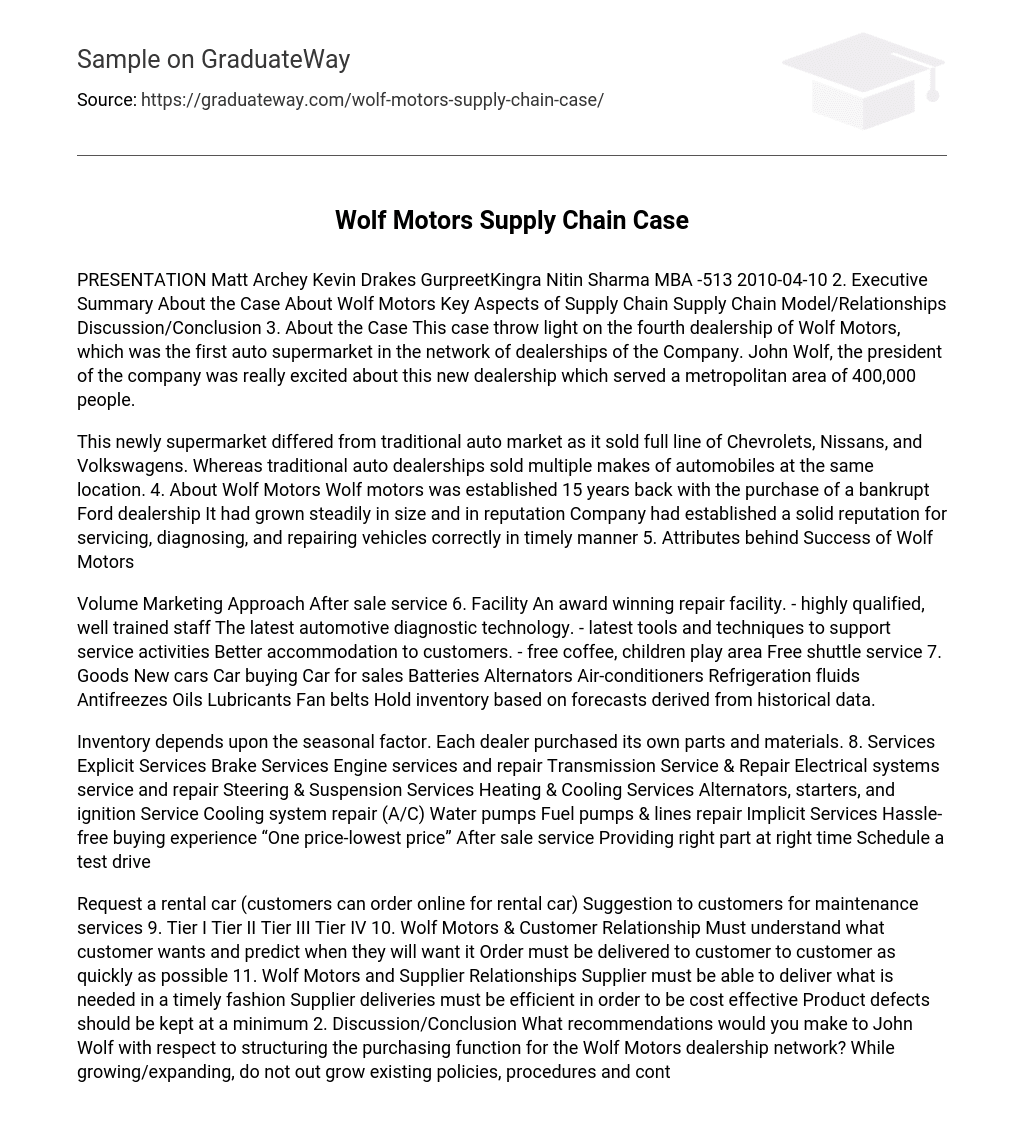About the Case This case throw light on the fourth dealership of Wolf Motors, which was the first auto supermarket in the network of dealerships of the Company. John Wolf, the president of the company was really excited about this new dealership which served a metropolitan area of 400,000 people. This newly supermarket differed from traditional auto market as it sold full line of Chevrolets, Nissans, and Volkswagens. Whereas traditional auto dealerships sold multiple makes of automobiles at the same location.
About Wolf Motors Wolf motors was established 15 years back with the purchase of a bankrupt Ford dealership It had grown steadily in size and in reputation Company had established a solid reputation for servicing, diagnosing, and repairing vehicles correctly in timely manner
Goods New cars Car buying Car for sales Batteries Alternators Air-conditioners Refrigeration fluids Antifreezes Oils Lubricants Fan belts Hold inventory based on forecasts derived from historical data. Inventory depends upon the seasonal factor. Each dealer purchased its own parts and materials.
Services Explicit Services Brake Services Engine services and repair Transmission Service & Repair Electrical systems service and repair Steering & Suspension Services Heating & Cooling Services Alternators, starters, and ignition Service Cooling system repair (A/C) Water pumps Fuel pumps & lines repair Implicit Services Hassle-free buying experience “One price-lowest price” After sale service Providing right part at right time Schedule a test drive. Request a rental car (customers can order online for rental car) Suggestion to customers for maintenance services
Wolf Motors & Customer Relationship Must understand what customer wants and predict when they will want it Order must be delivered to customer to customer as quickly as possible 11. Wolf Motors and Supplier Relationships Supplier must be able to deliver what is needed in a timely fashion Supplier deliveries must be efficient in order to be cost effective Product defects should be kept at a minimum 2.
Discussion/Conclusion What recommendations would you make to John Wolf with respect to structuring the purchasing function for the Wolf Motors dealership network? While growing/expanding, do not out grow existing policies, procedures and control system. A big problem could be a lack of a plan. Recommendations: When forecasting, try to forecast outside of Wolf Motors and look into other dealerships within the network. Speaking to vendors that deliver to other dealerships to pick up on trends.
Keep inventory with basic parts that are usually needed. Batteries, fuses, belts, oil, wiper blades, antifreeze, etc… Other parts can be ordered and delivered same day by local part stores. This will keep inventory low and not have things that are not used or needed. 14. An automated EDI inventory management system that interconnects with each of the dealerships and interfaces with the suppliers should be considered: system would alert purchasing agents and suppliers when critical inventory levels are reached.
Inventory Pooling between dealerships could eliminate the need to overstock; parts could be swapped between dealerships in emergency situations. A Vendor-Managed Inventory system would allow the suppliers to continuously replenish stock as needed to avoid shortages. 15. How might the purchasing policies and procedures differ as the dealership purchase different types of service parts and materials (e. g. , lubricants vs. GM parts)? Purchase generic parts or other parts/materials from local distributor/ manufacturers More flexibility on cost
Reduce the number of suppliers in the purchasing process by identifying a single source distributor for as many supply and product acquisitions as possible Economies of scale can be achieved by negotiating for better product pricing through higher volume purchasing 16. How can inventory management concepts help John Wolf reduce investment and space requirements while maintaining adequate service levels? Know what you have on hand and see how fast you can get it out the door. Concepts will help Wolf make adjustments to inventory levels to accommodate demands during peak seasons and promotional marketing periods.
Inventory management concepts example questions to ask:
- Average Sales: How many items do you expect to sell during a typical ordering period?
- Maximum Sales: What is the most you expect to sell?
- Bulk Order Quantity: How many items do you have to order at one time? For example, your supplier may require that you order by the case.
- Order Lead-Time: From the day you place the order, how long does it take for your shipment to arrive?
- Quantity on Hand: How many items do you currently have in stock?
- Quantity on Order: How many items do you currently have on order?





